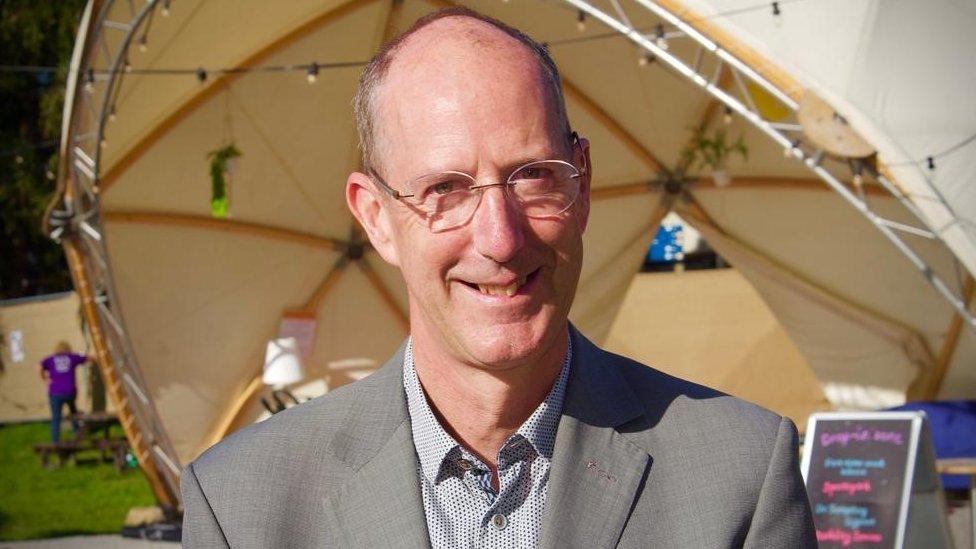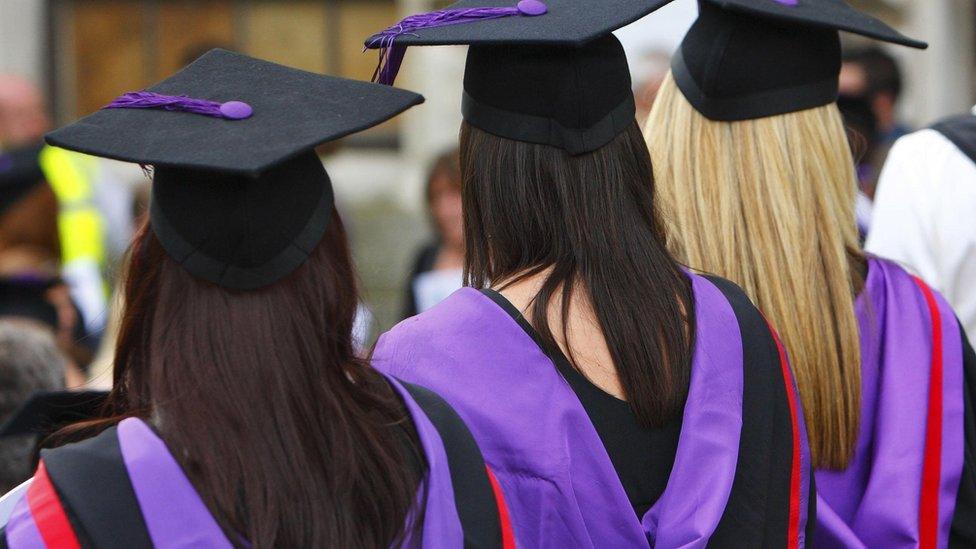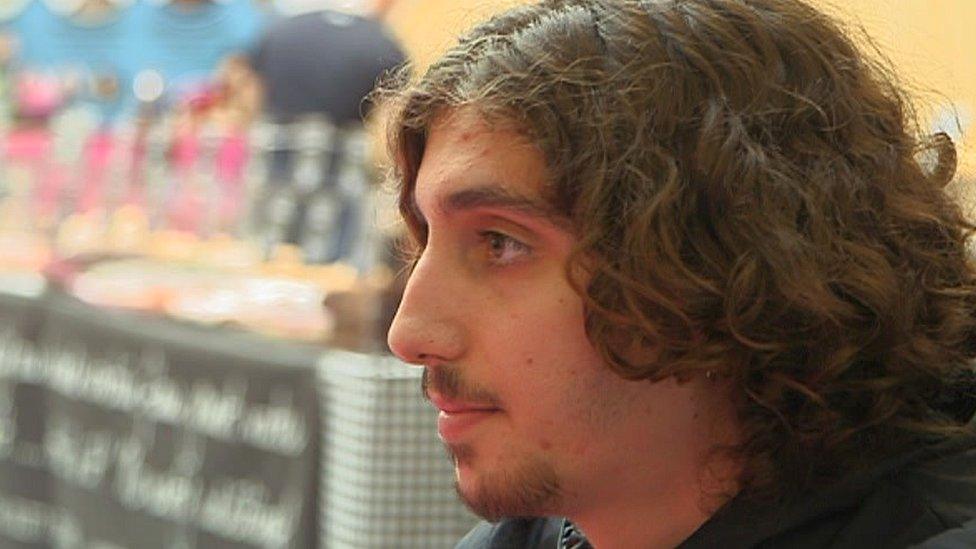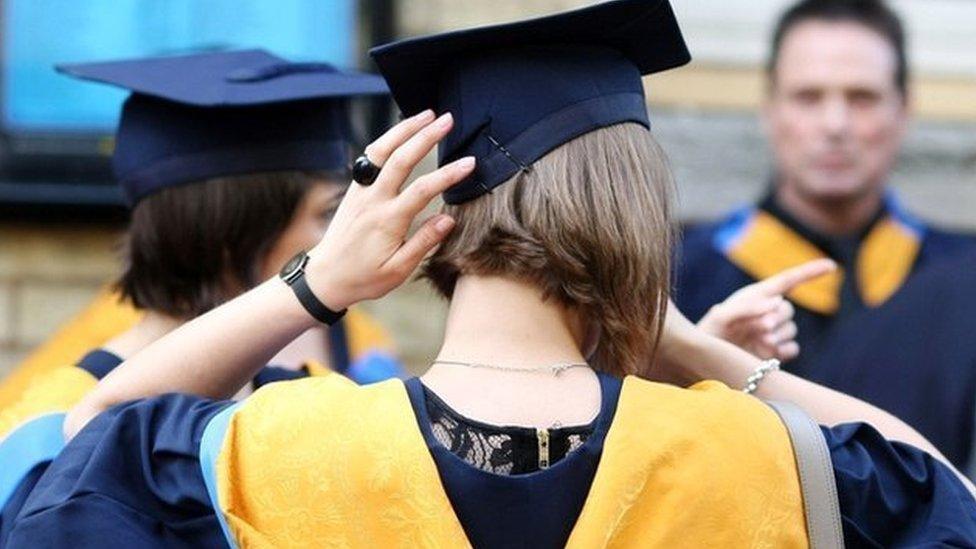Universities see EU students halve post-Brexit as non-EU numbers rise
- Published

Students at the University of East Anglia and the Norwich University of the Arts contribute about £135.5m to the economy of Norwich
Universities have seen the number of European Union students halve and a rise in non-EU learners since Brexit, a vice chancellor has said.
David Richardson said the University of East Anglia's EU student numbers had dropped by 50% in 2021, which was the picture "across the sector nationally".
However, he said non-EU student numbers were nearly back to pre-Covid levels.
The government said it was working to boost the number of international students in the country.
The number of EU students at the Norwich-based UEA dropped from 449 in 2020 to 226 this year, but the number of non-EU students rose from 1,194 to 1,494.

University of East Anglia Vice Chancellor David Richardson said there was a 50% drop in EU students in 2021
Prof Richardson said the number of international students at the UEA "dipped last year when we were at the height of the pandemic".
He said halving of EU students was happening "across the university sector nationally".
When the UK was in the EU, students from other member countries only had to pay up to £9,250 per year, the same as British nationals.
Since August 2021, tuition fees have been set by the universities, with some charging as much as £40,000 a year.

International students

International students contribute £28.8bn to the national economy, according to the Higher Education Policy Institute
First-year foreign students contribute £1.7bn a year to the East of England's economy and £28.8bn to the national economy, according to the Higher Education Policy Institute, external (HEPI).
This breaks down to:
£214m to the economy of Cambridge (University of Cambridge and Anglia Ruskin University students)
£135.5m to the economy of Norwich (UEA and Norwich University of the Arts students)
£107.5m to the economy of Welwyn Garden City and Hatfield (served by the University of Hertfordshire)
£62.9m to the economy of Colchester (served by Essex University)
£82.1m to the economy of Northampton (University of Northampton)
£28.6m to the economy of Ipswich (University of Suffolk)

Prof Richardson said international students were vital.
"A single year's cohort will contribute over £100m to the region," he said.
UEA student Andreas Cornelious, from Cyprus, said: "A lot of my friends in Cyprus do not want to come to university here [the UK] because of tuition fees being so high now because of Brexit and now there is no support from the EU."

UEA student Andreas Cornelious, from Cyprus, said many of his friends back home were now put off by the higher tuition fees in the UK
Cambridge and Chelmsford-based Anglia Ruskin University (ARU) saw its number of EU students drop from 503 in 2020 to 350 in 2021, while its number of non-EU international students rose from 1,764 to 2,050.
ARU's vice chancellor Roderick Watkins said: "We have seen a very significant decline of students joining us from the EU, as we anticipated, due to Brexit.
"But we have had several years of quite significant growth of international students from outside the EU and that... has more than offset the decline in EU students."
Universities and Colleges Admissions Service figures show that nationally EU student applications were 28,400 in 2021 compared with 49,650 in 2020 - a 43% drop.
On the other hand, non-EU student applications increased by 14% - from 89,130 in 2020 to 102,000 in 2021.
Overall there was a 6% decrease in international student applications from 138,770 in 2020 to 130,390 in 2021.
A Department for Education spokeswoman said: "International students - including those from the EU - are a vital and valued part of our higher education sector and having a proactive global education agenda is more important than ever so that we can recover from the pandemic.
"We have seen a significant rise in international students in recent years, and our recently-bolstered International Education Strategy aims to build on this, with an ambition to sustainably increase the number of international higher education students hosted in the UK to at least 600,000 per year by 2030."
Politics East airs on BBC One in the East on Sunday, 10 October at 10:00 BST and will be available on the BBC iPlayer afterwards.

Find BBC News: East of England on Facebook, external, Instagram, external and Twitter, external. If you have a story suggestion please email eastofenglandnews@bbc.co.uk
- Published2 March 2021

- Published17 February 2021

- Published24 December 2020
